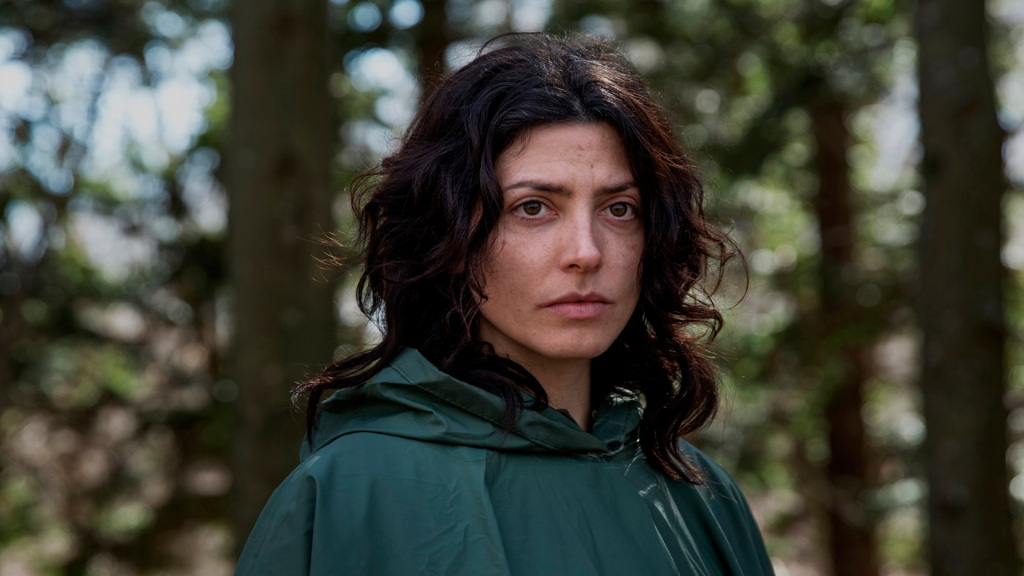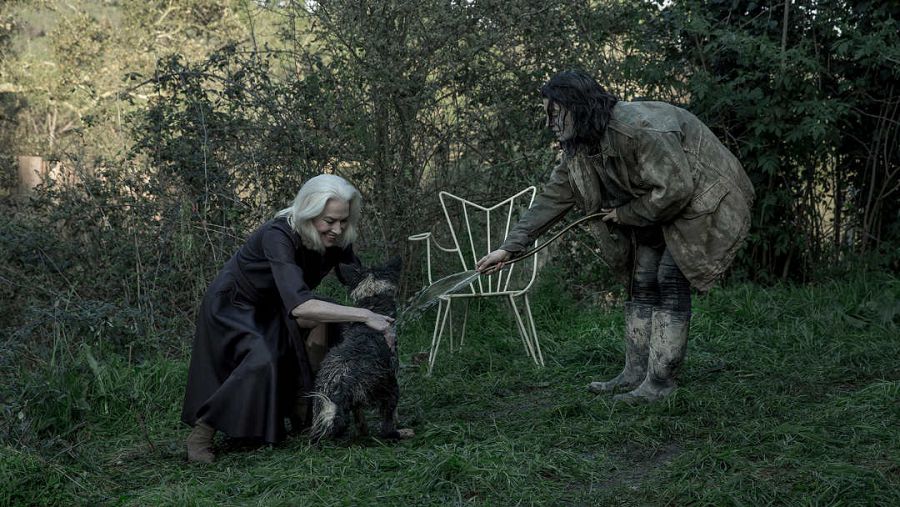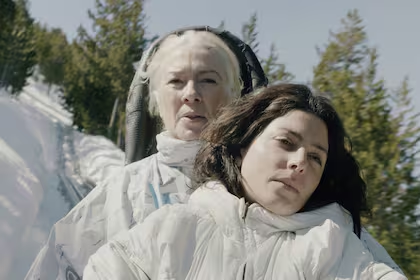Spoiler Alert! This article contains spoilers of "Sunday's Illness"!!!
“Sunday’s Illness” (La enfermedad del domingo) is a Spanish psychological drama film directed by Ramón Salazar, released in 2018. It stars Bárbara Lennie and Susi Sánchez, and explores themes of abandonment, forgiveness, and the complex emotional bond between a mother and daughter.
Anabel is a wealthy woman living a seemingly perfect life. Thirty-five years ago, she abandoned her daughter Chiara when the girl was just eight years old. One day, Chiara unexpectedly reappears and makes a strange request: she wants to spend ten days alone with her mother in a remote house. Anabel, restless but intrigued, agrees, hoping to make amends for the past.
As the days go by, the emotional tension between them intensifies. Chiara doesn’t seem to want a traditional reconciliation; her motivations are mysterious and tied to deep-seated pain. Through silence, small gestures, and subtle exchanges, their broken relationship is slowly unraveled. Later, it is revealed that Chiara is suffering from a chronic and painful disease. Anabel tries to help in any way she can, but Chiara insists she is constantly tired.
The film unfolds at a quiet, introspective pace, with minimal dialogue and a strong emphasis on mood, atmosphere, facial expressions, and inner worlds. In the end, Chiara asks Anabel for either one last favor or to leave. Anabel leaves abruptly and meets Matthieu, Chiara’s father. Matthieu admits he suggested the idea at first, and then Chiara refused to accept his help. Then he tells Anabel that Chiara only agreed to go forth with such an idea if she was to carry it out. Anabel accepts and goes back to Chiara’s house. She tells Chiara she has to be strong one last time, and they go to the lake. They swim naked, embracing each other one last time before Anabel fulfills Chiara’s wish of getting drowned – hence, freed from her suffering. This film portrays an understanding of love, loss, and redemption.

Why did Chiara want to spend 10 days with her long-lost mother?
I think Chiara wanted to do so because she knew she was dying, and she didn’t have much time left. In a way, her mother abandoning her and not even coming back to see her once left things unresolved. A sort of unfinished cycle, leaving Chiara wondering many things: What if Anabel had never left? Would she have become an addict if her mother had never abandoned her? Years of dealing with pain and grief, would it have been the same feeling? And most importantly, what is Anabel like? Who is she?
At the end of the movie, Chiara admits to her mother that she understands why she left. Even though she finally understood why she left, this doesn’t mean she fully knew her reasons or how she was as a person. Not even what her personality is like. As children, we grow up with a certain image of our parents; we think we know them, but we don’t. As soon as we become teenagers, we start looking at our parents’ flaws and understanding them on a deeper level, but we still have blind spots. We are too caught up in our own resentments against them, and we haven’t faced how brutal life can be. Once we leave our parents’ house, we understand them from a new lens. All that time, they had been young people struggling to stay afloat and raise children.
In my case, I even realized my parents were almost children struggling to raise other children. Just as my parents did, many people married in their early twenties and had children at a young age. I can’t imagine myself having kids at this age. I’m barely getting to know myself. I have spent years between my late teens and early twenties going to therapy and healing old wounds, and I have tried to end the same pattern of harmful behaviors that everyone in my family has. People like Anabel can be lost too; they don’t know who they are, and they are desperately trying to get through life’s hardships, even though they have a blurry mind and carry emotional baggage that keeps dragging them down.
Chiara Was Ready to Let Go
There is a scene that I can’t stop thinking about, which is when Chiara tells Anabel she has forgiven her and that she’s not resentful. I keep coming back to Chiara’s words because Anabel never showed up once after she abandoned her, never mind asking for forgiveness. How can you forgive someone who didn’t ask for it?
As people, we often forgive people who didn’t ask for forgiveness, especially our parents. How can we do so? We forgive after years by trying to understand their background. It’s easier to empathize with someone’s hurtful actions if we consider their motivations. Chiara forgives her mother because, as she previously said, she understood why she left. Anabel was a young woman trapped in a relationship she didn’t feel comfortable in, someone who felt lost and was hungry to discover the world, to get more from life. Chiara’s conclusion about Anabel wasn’t wrong. Anabel admitted to Matthieu that she left because she wanted more. In the end, she is also honest about having found more; she got more, but the pain never went away. We want more things, more money, more power as a distraction or as if that was going to satisfy the lack of self-acceptance we deal with every day.

Why do we forgive someone who didn’t ask for it?
We do so for ourselves. For our healing journey. We have to consider that everyone faces hardship and processes their grief in different ways; everyone is entitled to do so. Each one of us has a path, and many of us forgive those who didn’t ask for it because it is a way of letting go of the resentment or the hate that keeps holding us back. Many people say, “I forgive, but I never forget”. However, I would argue that it is rather convenient to forgive and forget. If we don’t forget, we keep coming back to reimagining what happened and replaying the pain in our minds, often clinging to such pain. I would argue that to heal, you need to let go for your own good. Pain drags us down, but of course, I’m coming from a certain place of privilege because I’ve been able to spend a lot of time and resources on healing and therapy. And as I said, no one is obliged to face their pain in a specific way. Chiara reminds me of my process of forgiving my mom. If I clung to what happened and the details of what she did to me, I would keep remembering every little detail that hurt me, infuriated me, disappointed me, and also contributed to hating myself for what happened, because I would keep wondering –What did I do to deserve this? The reality is that none of us does anything to deserve mistreatment from our parents; we are rather part of a bigger chain of unresolved trauma, which is also passed down through generations. And we can’t blame our parents. Our parents, grandparents, and great-grandparents didn’t have the resources that we have to start a path of improvement and healing. Not only was mental health taboo and kept secret years ago, but our grandparents or great-grandparents faced horrible times, surrounded by war, famine, or political instability that made them leave their countries. I’m not saying there aren’t any current wars or political abuse; however, there aren’t as many as there used to be.
Chiara had faced her pain, run away from it, and inevitably faced it again. The pain from being abandoned and feeling unwanted. She even admitted to having dealt with addiction and consumption of substances as detrimental as heroin. She tried to heal and asked Anabel to stay with her for only 10 days, as one last attempt at closure and redemption. Perhaps, it was one last attempt at letting go of this world and all the suffering it comes with before passing away. One last painful yet necessary goodbye.







2r5c9n
KRAKEN – Ваша безопасность и анонимность на aktual-krkn.ru
aktual-krkn.ru — официальный переходник даркнет-маркета Kraken.
Добро пожаловать на kra36—-at.com, где приватность и безопасность являются главным приоритетом. Официальный сайт kraken kra37.at — сохрани список актуальных зеркал. Переходите на aktual-krkn.ru и начните пользоваться прямо сейчас!
кракен, kraken, сайт кракен, ссылка кракен, кракен ссылка, кракен сайт, кракен официальный сайт, официальный сайт кракен, кракен ссылка официальная, кракен актуальная ссылка
*Полная анонимность и защита данных
Система безопасности KRAKEN обеспечивает полную конфиденциальность. Передовые технологии шифрования для защиты ваших данных и транзакций.
актуальная ссылка на кракен, рабочая ссылка кракен, как зайти на кракен, кракен как зайти, вход кракен, кракен вход, зайти на кракен, кракен зайти, зеркало кракен, кракен зеркало
*Удобство использования
Простая навигация, мощная система и дизайн aktual-krkn.ru делают использование KRAKEN комфортным на любых устройствах.
кракен рабочее зеркало, рабочее зеркало кракен, зеркала кракен, кракен зеркала, даркнет кракен, кракен даркнет, маркетплейс кракен, кракен маркетплейс, площадка кракен, кракен площадка
*Гарантии безопасности и круглосуточная поддержка
KRAKEN гарантирует защиту покупателей и продавцов. Служба поддержки kra36—-at.com работает 24/7 для решения любых вопросов.
магазин кракен, кракен магазин, кракен маркет, кракены маркет, кракен даркнет маркет, кракен маркет даркнет, кракен отзывы, кракен сайт что, кракен ссылка тор, ссылка кракен тор
09nopw
4bb8jz
rzywug
rrcozw
uwwbf4
fj0bpl
jaaata
sw5yph
**mind vault**
mind vault is a premium cognitive support formula created for adults 45+. It’s thoughtfully designed to help maintain clear thinking
**sugarmute**
sugarmute is a science-guided nutritional supplement created to help maintain balanced blood sugar while supporting steady energy and mental clarity.
**gl pro**
gl pro is a natural dietary supplement designed to promote balanced blood sugar levels and curb sugar cravings.
**prostadine**
prostadine is a next-generation prostate support formula designed to help maintain, restore, and enhance optimal male prostate performance.
**prodentim**
prodentim an advanced probiotic formulation designed to support exceptional oral hygiene while fortifying teeth and gums.
**glucore**
glucore is a nutritional supplement that is given to patients daily to assist in maintaining healthy blood sugar and metabolic rates.
**vittaburn**
vittaburn is a liquid dietary supplement formulated to support healthy weight reduction by increasing metabolic rate, reducing hunger, and promoting fat loss.
**synaptigen**
synaptigen is a next-generation brain support supplement that blends natural nootropics, adaptogens
**nitric boost**
nitric boost is a dietary formula crafted to enhance vitality and promote overall well-being.
**wildgut**
wildgutis a precision-crafted nutritional blend designed to nurture your dog’s digestive tract.
**mitolyn**
mitolyn a nature-inspired supplement crafted to elevate metabolic activity and support sustainable weight management.
**zencortex**
zencortex contains only the natural ingredients that are effective in supporting incredible hearing naturally.
**yu sleep**
yusleep is a gentle, nano-enhanced nightly blend designed to help you drift off quickly, stay asleep longer, and wake feeling clear.
**breathe**
breathe is a plant-powered tincture crafted to promote lung performance and enhance your breathing quality.
**pineal xt**
pinealxt is a revolutionary supplement that promotes proper pineal gland function and energy levels to support healthy body function.
**energeia**
energeia is the first and only recipe that targets the root cause of stubborn belly fat and Deadly visceral fat.
**prostabliss**
prostabliss is a carefully developed dietary formula aimed at nurturing prostate vitality and improving urinary comfort.
**boostaro**
boostaro is a specially crafted dietary supplement for men who want to elevate their overall health and vitality.
**potentstream**
potentstream is engineered to promote prostate well-being by counteracting the residue that can build up from hard-water minerals within the urinary tract.
**hepato burn**
hepato burn is a premium nutritional formula designed to enhance liver function, boost metabolism, and support natural fat breakdown.
**hepato burn**
hepato burn is a potent, plant-based formula created to promote optimal liver performance and naturally stimulate fat-burning mechanisms.
**flow force max**
flow force max delivers a forward-thinking, plant-focused way to support prostate health—while also helping maintain everyday energy, libido, and overall vitality.
**prodentim**
prodentim is a forward-thinking oral wellness blend crafted to nurture and maintain a balanced mouth microbiome.
**cellufend**
cellufend is a natural supplement developed to support balanced blood sugar levels through a blend of botanical extracts and essential nutrients.
**neuro genica**
neuro genica is a dietary supplement formulated to support nerve health and ease discomfort associated with neuropathy.
**revitag**
revitag is a daily skin-support formula created to promote a healthy complexion and visibly diminish the appearance of skin tags.
**sleeplean**
sleeplean is a US-trusted, naturally focused nighttime support formula that helps your body burn fat while you rest.
**memory lift**
memory lift is an innovative dietary formula designed to naturally nurture brain wellness and sharpen cognitive performance.
Solid article! Thinking about bankroll management & variance is key in tournaments. Seeing platforms like phlago vip offer diverse games is great, but responsible play is always first. Good read!
roulette strategy
References:
https://linkagogo.trade/story.php?title=what-is-pglucky88-and-what-does-it-offer-ask-and-answer-glarity
casino queen
References:
https://docentesdeingles.ec/employer/top-10-largest-casinos-in-australia-2025/
elgin casino
References:
https://gitea.adminakademia.pl/benniepetit927
castle casino
References:
http://git.chilidoginteractive.com:3000/vanita15752871
Go99vina, never heard of it before today. Decided to give it a try. Registering was easy enough, and the bonus seemed okay. The game variety isn’t amazing, but there’s enough to keep you busy. Check it out – it’s go99vina.
west virginia casinos
References:
http://www.joi3.com/go.php?url=http://shiftdelete.10tl.net/member.php?action=profile&uid=238265
Bigwin69login… I’m all about the big wins! Logged in, played some, and it was a decent experience. Give it a shot and see if you can snag a big one: bigwin69login
silver reef casino
References:
https://todosobrelaesquizofrenia.com/Redirect/?url=https://go.bubbl.us/eee908/0af7?/Bookmarks
Diese betreffen unter anderem das Spielangebot der deutschen Casinos. Du kannst dich in den meisten deutschen Casinos aber auf eine vielfältige Auswahl freuen. Fair ist ein Bonus nur, wenn du reelle Chancen darauf hast, diesen für die Auszahlung freizuspielen. Mehr als 600 Spielautomaten kannst du im PlayOJO Casino um echtes Geld spielen.
Die Plattform ist in Deutschland lizenziert und hält sich an die strengen Vorschriften des Glücksspielstaatsvertrags (GGL), was ein zusätzliches Vertrauensmerkmal darstellt. Hinsichtlich der Zahlungsmethoden bietet bet365 Slots die beliebten Optionen wie PayPal, Skrill und Neteller an, mit Einzahlungslimits, die nach Verifizierung bis zu 1.000 € monatlich erreichen können. Lassen Sie sich diese beste Online Spielbank 2025 mit guter Auszahlungsrate nicht entgehen und profitieren auch Sie vom Betano Bonus als Neukunde! Die https://online-spielhallen.de/betano-slots-erfahrungen-2025-test-bewertung/-Spiele, darunter natürlich auch Neuheiten sowie die besten Slot-Klassiker aus der Online-Spiele-Welt, wie Starburst und Book of Dead, machen diese Spiele Plattform wirklich einzigartig. Insgesamt finden Sie mehr als 2.000 Online Casino Spiele bei Wunderino Casino. Wunderino bietet einen mehrsprachigen Kundensupport per Live Chat an, der rund um die Uhr erreichbar ist.
Wir vom Hit`n`Spin Casino sind uns durchaus der Tatsache bewusst, dass Boni und Aktionen zu einem spannenden Erlebnis beim Glücksspiel einfach dazugehören. Besuchen Sie also am besten gleich unsere Homepage, um alle nötigen Informationen erhalten zu können. Unser Online Casino bietet eine riesige Auswahl von Spielen, die für Sie zur Verfügung stehen. Das Casino bietet eine breite Palette von Zahlungsmöglichkeiten, darunter Kreditkarten, E-Wallets und Banküberweisungen. Das Hitnspin Casino boni sind vielfältig und umfassen Willkommenspakete, Einzahlungsboni und regelmäßige Promotionen für bestehende Spieler. Der Google Play Store bietet eine unkomplizierte Lösung für Spielbegeisterte.
Häufig stockt die Verbindung beim ersten Versuch – einfach nochmals tippen hilft. Die hitnspin App zeigt direkt nach dem Start den charakteristischen roten Login-Button am unteren Bildschirmrand. Nach erfolgreicher Anmeldung im Hitnspin casino erscheint sofort die persönliche Kontoübersicht. Das Hitnspin Casino bietet umfangreiche Kontofunktionen für ein optimales Spielerlebnis.
References:
https://online-spielhallen.de/jet-casino-test-2025-login-boni-zahlungen-sicherheit/
Wir bringen Licht ins Dunkle und vergleichen die besten Bonusangebote in Deutschland. Das gleiche gilt auch für Freispiele oder einen 10 € No Deposit Bonus. In Sachen Casino Willkommensbonus hast du zumindest ein ganz wichtiges Kriterium im Köcher, bei dem du vergleichen, aussieben und deinen Wunschpartner finden kannst. Anstatt dem Online Casino 10 Euro Startguthaben gibt esFreispiele& Extraguthaben bis100€! Wenn Sie diesen Technologien zustimmen, können wir Daten wie Ihr Surfverhalten oder eindeutige IDs auf dieser Seite verarbeiten.
Ob Slots oder klassische Tischspiele, hier kommt jeder Glücksspielfan auf seine Kosten. Trotz seiner relativ geringen Erfahrung versorgt der Anbieter seine User mit einem erstklassigen Spielangebot. In den meisten Fällen handelt es sich dabei um einen Registrierungsbonus. Der Wettbewerb auf dem Gambling-Markt ist so intensiv, dass Online Casinos auf die unterschiedlichsten Methoden zurückgreifen, um Neukunden zu gewinnen. Willkommen beim 100% Casino-Bonusangebot für neue Spieler bei Leon! Mein Ziel ist es, Spielern dabei zu helfen, seriöse Casinos und die besten Bonusangebote zu finden.
References:
https://online-spielhallen.de/bizzo-casino-deutschland-test-boni-erfahrungen/
Um sicher zu spielen, müssen Online Casinos eine gültige Lizenz vorweisen, die regelmäßig überprüft wird. Die besten Online Casinos in Deutschland sind staatlich lizenziert und bieten ein sicheres Spielerlebnis. Die Plattform bietet einen rund um die Uhr Support, der speziell auf deutsche Spieler ausgerichtet ist. Zudem sind die Bonusangebote und regelmäßigen Aktionen ein zusätzlicher Anreiz, um hier zu spielen. North Casino ist bekannt für seine breite Palette an Spielautomaten und Tischspielen. Eines der herausragenden Beispiele ist North Casino, das für seine breite Palette an Spielautomaten und Tischspielen bekannt ist. Nur legale Glücksspielanbieter mit deutscher Lizenz schaffen es in unsere Auswahl.
Die VIP- und Treueboni basieren in der Regel auf unterschiedlichen Stufen. Neben den regulären Bonusangeboten setzen die Top Casinos in Deutschland auf umfangreiche VIP- und Treueboni. Die meisten Reload Boni basieren auf klassischen Einzahlungsboni und bringen euch je nach Einzahlung ein gewisses Bonusguthaben.
References:
https://online-spielhallen.de/verde-casino-bonuscode-25e-promo-2025-ubersicht/
Verde Casino bietet ein umfassendes Angebot an Ein- und Auszahlungsmöglichkeiten für Spieler in Deutschland. Bei Fragen zu Ihrem Spielerkonto, Zahlungen, Identitätsprüfung, Bonusbedingungen oder technischen Problemen wenden Sie sich bitte direkt an den offiziellen Support von Verde über deren Website. Ihren Spam‑Ordner, falls Sie keine Rückmeldung erhalten. Slots tragen zu 100% bei, Tischspiele zu 10%. Der Willkommensbonus hat eine 40x Umsatzbedingung, die nur auf den Bonusbetrag angewendet wird.
Beanspruchen Sie Ihr Profil, um Zugang zu den kostenfreien Business-Tools von Trustpilot zu erhalten und die Beziehung zu Ihren Kunden zu stärken. Super Zeitvertreib Bei Problemen kompetente und schnelle Hilfe über live chat Seite bei Trustpilot verdecasino
References:
https://online-spielhallen.de/top-neue-online-casinos-in-deutschland-nov-2025/
poker desire
References:
http://wzgroupup.hkhz76.badudns.cc/home.php?mod=space&uid=4030607
pci slot fan
References:
https://pad.stuve.de/Cqw-jwoQREqW9oX_RVU6UQ/
redhawk casino
References:
https://doc.adminforge.de/sO1PO2cuRGO03lrVB_VCkw/
Sprunki Incredibox brings a fresh twist to music creation that feels both intuitive and inspiring. As someone who values creative freedom, I appreciate how it builds on the original while adding its own unique sound. Check it out: Sprunki Incredibox.
Le site web 1xbet rdc telecharger propose des informations sur les paris sportifs, les cotes et les evenements en direct. Football, tournois populaires, cotes et statistiques y sont presentes. Ce site est ideal pour se familiariser avec les fonctionnalites de la plateforme.
This is a very good tips especially to those new to blogosphere, brief and accurate information… Thanks for sharing this one. A must read article.
Нужен эвакуатор? вызов эвакуатора дешево быстро быстрый выезд по Санкт-Петербургу и области. Аккуратно погрузим легковое авто, кроссовер, мотоцикл. Перевозка после ДТП и поломок, помощь с запуском/колесом. Прозрачная цена, без навязываний.
Нужны заклепки? заклепка вытяжная нержавеющая для прочного соединения листового металла и профиля. Стойкость к коррозии, аккуратная головка, надежная фиксация даже при вибрациях. Подбор размеров и типа борта, быстрая отгрузка и доставка.
Текущие обновления: Где продать MIDI-клавиатуру за деньги — выгодная скупка
Нужен эвакуатор? эвакуатор дешево и быстро быстрый выезд по Санкт-Петербургу и области. Аккуратно погрузим легковое авто, кроссовер, мотоцикл. Перевозка после ДТП и поломок, помощь с запуском/колесом. Прозрачная цена, без навязываний.
Read more on the website: https://woodbridgebrewingco.com/art/top-strategies-for-winning-at-online-roulette.html
The whole summary is here: https://www.kopaida.gr/?p=6136
Our highlights: https://saest.ufpa.br/docs/pages/?como-se-registrar-e-receber-bonus.html
Нужна косметика? корейская косметика заказать большой выбор оригинальных средств K-beauty. Уход для всех типов кожи, новинки и хиты продаж. Поможем подобрать продукты, выгодные цены, акции и оперативная доставка по Алматы.
Looking for a casino? https://elon-casino-top.com: slots, live casino, bonus offers, and tournaments. We cover the rules, wagering requirements, withdrawals, and account security. Please review the terms and conditions before playing.
Нужны грузчики? грузоперевозки чехов : переезды, доставка мебели и техники, погрузка и разгрузка. Подберём транспорт под объём груза, обеспечим аккуратную работу и соблюдение сроков. Прозрачные тарифы и удобный заказ.
Планируешь перевозку? переезд квартиры в другой город удобное решение для переездов и доставки. Погрузка, транспортировка и разгрузка в одном сервисе. Работаем аккуратно и оперативно, подбираем машину под объём груза. Почасовая оплата, без переплат.
Ищешь грузчиков? заказать грузчиков помощь при переезде, доставке и монтаже. Аккуратная работа с мебелью и техникой, подъем на этаж, разборка и сборка. Гибкий график, быстрый выезд и понятная стоимость.
стартовал наш новый https://utgardtv.com IPTV?сервис, созданный специально для зрителей из СНГ и Европы! более 2900+ телеканалов в высоком качестве (HD / UHD / 4K). Пакеты по регионам: Россия, Украина, Беларусь, Кавказ, Европа, Азия. Фильмы, Спорт, Музыка, Дети, Познавательные. Отдельный пакет 18+
Ищешь музыку? скачать музыку 2026 популярные треки, новые релизы, плейлисты по жанрам и настроению. Удобный плеер, поиск по исполнителям и альбомам, стабильное качество звука. Включайте музыку в любое время.
Visit Site – Layout is crisp, browsing is easy, and content feels trustworthy and clear.
need a video? film production company in italy offering full-cycle services: concept, scripting, filming, editing and post-production. Commercials, corporate videos, social media content and branded storytelling. Professional crew, modern equipment and a creative approach tailored to your goals.
Нужна фотокнига? заказать фотокнигу онлайн печать из ваших фотографий в высоком качестве. Разные форматы и обложки, плотная бумага, современный дизайн. Поможем с макетом, быстрая печать и доставка. Идеально для подарка и семейных архивов
Хочешь фотокнигу? фотокниги онлайн заказать индивидуальный дизайн, премиальная печать и аккуратная сборка. Большой выбор размеров и переплётов, помощь с версткой. Быстрое производство и доставка
trans porn
дайсон купить стайлер официальный сайт fen-dn-kupit-11.ru .
Продажа тяговых https://faamru.com аккумуляторных батарей для вилочных погрузчиков, ричтраков, электротележек и штабелеров. Решения для интенсивной складской работы: стабильная мощность, долгий ресурс, надёжная работа в сменном режиме, помощь с подбором АКБ по параметрам техники и оперативная поставка под задачу
Продажа тяговых https://ab-resurs.ru аккумуляторных батарей для вилочных погрузчиков и штабелеров. Надёжные решения для стабильной работы складской техники: большой выбор АКБ, профессиональный подбор по параметрам, консультации специалистов, гарантия и оперативная поставка для складов и производств по всей России
фен купить дайсон официальный сайт fen-dn-kupit-11.ru .
Продажа тяговых https://faamru.com аккумуляторных батарей для вилочных погрузчиков, ричтраков, электротележек и штабелеров. Решения для интенсивной складской работы: стабильная мощность, долгий ресурс, надёжная работа в сменном режиме, помощь с подбором АКБ по параметрам техники и оперативная поставка под задачу
фен dyson купить оригинал fen-dn-kupit-11.ru .
монтаж плоской кровли под ключ https://ustrojstvo-ploskoj-krovli.ru
Продажа тяговых https://ab-resurs.ru аккумуляторных батарей для вилочных погрузчиков и штабелеров. Надёжные решения для стабильной работы складской техники: большой выбор АКБ, профессиональный подбор по параметрам, консультации специалистов, гарантия и оперативная поставка для складов и производств по всей России
фен дайсон оригинал купить официальный fen-dn-kupit-11.ru .
Все актуальные адреса на кракен ссылка для безопасного входа обновляются ежедневно администрацией площадки
The best is in one place: https://ramboskitchen.ca/australias-best-online-casino-royal-reels-16/
Капельницы от похмелья в Севастополе https://vrachnadom-sev.ru
Официальная даркнет площадка на кракен в даркнет с escrow защитой для безопасности всех сделок
Продажа тяговых ab-resurs.ru аккумуляторных батарей для вилочных погрузчиков и штабелеров. Надёжные решения для стабильной работы складской техники: большой выбор АКБ, профессиональный подбор по параметрам, консультации специалистов, гарантия и оперативная поставка для складов и производств по всей России
Продажа тяговых faamru.com аккумуляторных батарей для вилочных погрузчиков, ричтраков, электротележек и штабелеров. Решения для интенсивной складской работы: стабильная мощность, долгий ресурс, надёжная работа в сменном режиме, помощь с подбором АКБ по параметрам техники и оперативная поставка под задачу
фен дайсон как отличить оригинал stajler-dsn.ru .
dyson фен оригинал dn-fen-kupit.ru .
купить дайсон стайлер с насадками для волос цена официальный сай… купить дайсон стайлер с насадками для волос цена официальный сай… .
фен дайсон купить оригинал фен дайсон купить оригинал .
пылесос дайсон купить в воронеже pylesos-dn-1.ru .
фен купить дайсон фен купить дайсон .
фен купить дайсон оригинал stajler-dsn.ru .
цена дайсон стайлер для волос с насадками официальный сайт купит… цена дайсон стайлер для волос с насадками официальный сайт купит… .
пылесос дайсон беспроводной купить в краснодаре pylesos-dn-1.ru .
стайлер для волос дайсон с насадками официальный сайт купить цен… стайлер для волос дайсон с насадками официальный сайт купить цен… .
стайлер купить дайсон официальный сайт fen-dn-kupit-12.ru .
дайсон стайлер для волос цена официальный сайт купить с насадкам… stajler-dsn-1.ru .
пылесос dyson купить в спб пылесос dyson купить в спб .
пылесос дайсон купить в нижнем новгороде pylesos-dn-kupit-1.ru .
купить пылесос дайсон мощный pylesos-dn-kupit.ru .
купить пылесос дайсон беспроводной v15 купить пылесос дайсон беспроводной v15 .
купить пылесос дайсон в санкт pylesos-dn-kupit-2.ru .
фен дайсон как отличить оригинал stajler-dsn.ru .
цена дайсон стайлер для волос с насадками официальный сайт купит… цена дайсон стайлер для волос с насадками официальный сайт купит… .
купить пылесос дайсон беспроводной v15 купить пылесос дайсон беспроводной v15 .
фен dyson купить оригинал фен dyson купить оригинал .
дайсон стайлер для волос купить цена официальный сайт с насадкам… fen-dn-kupit-12.ru .
купить стайлер дайсон новосибирск купить стайлер дайсон новосибирск .
пылесосы дайсон официальный пылесосы дайсон официальный .
купить пылесос дайсон v15 в москве оригинал pylesos-dsn.ru .
пылесос дайсон купить москва официальный pylesos-dn-kupit-1.ru .
пылесос dyson вертикальный купить pylesos-dn-kupit.ru .
пылесос дайсон беспроводной купить в краснодаре pylesos-dn-kupit-2.ru .
купить фен дайсон официальный stajler-dsn.ru .
стайлер дайсон для волос с насадками цена купить официальный сай… dn-fen-kupit.ru .
купить пылесос дайсон в краснодаре купить пылесос дайсон в краснодаре .
фен дайсон оригинал купить официальный fen-dn-kupit-13.ru .
купить дайсон стайлер для волос с насадками официальный сайт цен… fen-dn-kupit-12.ru .
дайсон стайлер для волос купить официальный сайт с насадками цен… дайсон стайлер для волос купить официальный сайт с насадками цен… .
купить пылесос дайсон проводной купить пылесос дайсон проводной .
пылесос дайсон беспроводной купить в краснодаре pylesos-dn-2.ru .
пылесос дайсон купить москва официальный pylesos-dn-kupit-1.ru .
пылесос dyson absolute pylesos-dn-kupit.ru .
пылесосы dyson официальный пылесосы dyson официальный .
пылесос дайсон купить интернет пылесос дайсон купить интернет .
купить аккумулятор пылесос dyson купить аккумулятор пылесос dyson .
dyson v12 пылесос dyson v12 пылесос .
купить пылесос дайсон новосибирск pylesos-dsn.ru .
купить пылесос дайсон в нижнем купить пылесос дайсон в нижнем .
пылесос дайсон напольный купить pylesos-dn-kupit.ru .
дайсон томск купить пылесос pylesos-dn-2.ru .
пылесос dyson купить в спб пылесос dyson купить в спб .
dyson пылесос v15 absolute pylesos-dn-kupit-2.ru .
купить пылесос дайсон проводной купить пылесос дайсон проводной .
пылесос dyson detect купить dn-pylesos-kupit.ru .
пылесосы для дома дайсон купить pylesos-dsn-1.ru .
пылесос дайсон где купить пылесос дайсон где купить .
Для быстрого ремонта натяжной потолок удобнее, чем выравнивать плиту и ждать высыхания, выбирайте белое матовое полотно, оно дает чистый финиш без мокрых работ, не гонитесь за самой низкой ценой, важнее качество крепежа, ремонт пройдет быстрее, а уборки после монтажа будет минимум https://natyazhnye-potolki-moskva.ru/